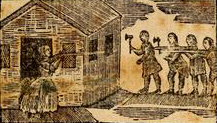from New England Historical and Genealogical Register, 1866
Daniel, b. in England about 1618, d. in Ipswich, 9 Sept., 1688; m.
1st w. Elizabeth Denne, who d. 1 Nov., 1659;
2d w. Faith Browne, widow of Edward Browne, m. 1 July, 1660, she d. 10 June, 1679 ;
3d w. widow Ellen Jewett, of Rowley, m. June, 1686, she d. 5 Ang., 1689.
Lived in Ipswich, and had 8 children, all by 1st w.,
(3) Daniel W. is always referred to as Senr. At the time of his death, his son and grandson, and brother John's son, making four of the same name, were living in Ipswich.
In 1661, a way was allowed through his 6 acres by Saunders's Brook, and in 1665 a bridge by his house.
Among several deeds on record, three may be noticed, viz.: 26 Sept., 1661, he sells for £74 10s. to Wallis, all that my farm or parcel of land, both upland and meadow, in Ipswich, on South side the river, having said river towards the N. W., land of J. Belcher towards the N. E., highway towards S. E., and of land of Thomas Safford on S. W." 3 July, 1662, Daniel W., "husbandman," sold to Thomas Lovell, 16 acres of west meadows, part of which was his father's, and part was Thomas Wells, adjoining John Warner on the N. W., and on the common all the other sides.
On 18 April, 1684, he records this,
my son Nathaniel W., being by God's providence upon a sick bed, and not knowing how the Lord may deal with him, and that there hath not been any settlement of any estate unto him, I have thought to do something for the comfort of his wife and child, &c.,
and after making provision for them he adds,
and if the child not visible be a daughter, she shall have £40 paid to her at the age of 18 years.
This was Hannah, who m. Ep. Fellows, and on 25 Feb., 1703, she acknowledged the receipt of £40 from her uncle John, Executor of her grandfather's estate.
In Faith Warner's Will, dated 25 June, 1669, she desires "my present husband Daniel W. to oversee its execution." The Inventory of her estate was taken 31 March, 1680. Her property went to her children by her first husband.
10 Nov., 1654, his aunt Sarah Stone, wife of Deacon Stone, of Watertown, made over to him
her house lot and housings, 2 acres, her 6 acre planting lot, and her Pine Swamp Farm, of 150 acres, to him and his heirs forever. In consideration he agrees forthwith to build a good and sufficient house upon the house lot, to pay her annuity of £4 in grain, and to her husband, if he survive her, £3, and that they shall dwell there at their pleasure, with a maid servant, &c. (Ipswich Record, Book 2, in Register Deeds Office, Salem.)
His Will, dated 7 Sept., 1688, gives to his sons Daniel and John each that part of his Pine Swamp Farm, of which they were already in possession, according to the division which they had made between them, Daniel to have in his part " the swamp we call Poplar Swamp."
He gives to Daniel
the most part of that house lot which was formerly Robert Grand's, next to Edm. Bridges, bounded by Edm. Hoard's land, on a straight line from a stump of a post within a pale fence at the street, to two posts that stand together in a corner next Mr. Norton's land, half- of which I intended to have given John, but understand that Daniel hath paid him for it.
[This is the house lot which his son Daniel in his will gave, half to Phil, and half to John, his sons; Phil, sold his part to Jon. Prince in 1710, when he removed to Gloucester, and John was living on his part in 1717, as marked on a plan now on record at Salem. It is on Market street, in Ipswich, between the Railroad Depot and Peabody's brook; the premises are now, 1865, occupied by the houses of Mrs. N. Rogers Farley, Gardner, Robert Kimball, blacksmith's shop, and widow Jos. Chapman.]
He divides the marsh and Plum Island land between Daniel and John. Also provides for his wife Ellen, son William, daughters Elisabeth, Abigail, and Susannah, and grandchild Nathaniel, and his son William's son Daniel. His grandchild Nathaniel, to whom he had given a lot of 20 acres, with dwelling house, &c., bounded on the N. W. by the town common, W. and S. W. by J. Whipple, S. E. by the River, N. E. by widow Appleton, and N. by Maj. Dennisbn, is to pay his Sister Hannah, and mother Hannah Batcheldor, certain sums of money. On the death of Nathl all the heirs of Daniel W. Sen. joined in conveying this property to Michael Farley, 28 Feb., 1698, viz.: John and William, his sons, John and Ab. Dane and I Mm. and Elizabeth Heard, his daughters, and the children of his son Daniel, viz. : Daniel, Phil., Sarah, John and Mercy.
In the Inventory of his Estate, amounting to £707 1 9, his "house, barn, orchard, and land about it 21 acres, is set down at £160. The farm Daniel and John dwell upon, £200," &c.


